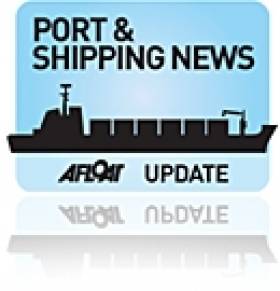Displaying items by tag: Irish Sea short sea shipping
The Timber Traders and Days of Old Irish Sea Shipping Companies
#PORTS & SHIPPING- The general dry-cargo vessel, Red Duchess berthed at Ardrishaig on Scotland's west coast at Loch Fyne today, after completion of a voyage from Waterford, writes Jehan Ashmore.
The 1969-built coaster rounded the Hook Head Lighthouse yesterday around noon, having departed Belview on Waterford Estuary. She is engaged on the Irish Sea timber trade, which have been the mainstay of the cruiser stern-vessel's career (see PHOTO).This feature maybe commonplace among yachting craft, yet it is an increasing rare feature, to be found on commercial ships these days.
Her builders were Bodewes Hoogezand Scheepswerf, Bergum of The Netherlands, though the veteran vessel received a modernisation programme in 1995. In addition to the 1,285grt Red Duchess, her fleetmate Red Baroness (1979/964grt) is also actively employed on the same trade.
Each vessel has a single 80m box-hold which can also handle coal, fertiliser, salt and stone. The UK flagged vessels are owned and managed by Coast Lines Shipping based in Midleton, Co. Cork which was established in 1981. For photos of the fleet and technical details, click HERE.
The name of the Irish shipping company revives the similarly named Coast Lines which was synonymous with the British & Irish Steam Packet Co. Ltd otherwise known as B+I Line. By 1917 the Coast Lines group operated seven Irish shipping companies and held all the shares in B+I Line.
The group also had a half interest in David MacBrayne, which was together acquired in the same year by Lord Kylsant's Royal Mail Steam Packet. It was during the Kylsant period that one of their vessels, the 696 ton Lochfyne served David MacBrayne. The Kylsant shipping empire collapsed and Coast Lines regained independence in 1935.
It is apt to have these historical associations as successors to David MacBrayne, now Caledonian MacBrayne (CalMac) are Scotland's largest island ferry network which includes the Loch Fyne ferry (PHOTO) route of Portavadie-Tarbert with the remote location of Ardrishaig further up the Loch.
By 1965 Coast Lines sold their British & Irish (including the associated City of Cork Co.) to the Irish Government and the remaining part of the company was purchased by P&O in 1971. This marked an end of era, with the names of several Irish Sea freight and ferry operators slipping away.
As for Coast Lines Shipping, which was established in 1981, both Red Duchess and Red Baroness are on a time charter arrangement with JST Services. The Ayr-based company provide an integrated shipping, handling and road haulage timber business in addition to the carriage of other cargoes.
Asides serving Ardrishaig, the red-hulled vessels call to their adopted homeport of Ayr, Campbeltown and Sandbank. In addition they call to Troon, where both coasters are registered (see PHOTO). From these ports they sail to Irish ports, in particular Derry, Youghal and Passage West, a privately-owned wharf in the centre of Cork Harbour.
Timber products can include logs, which are loaded by a grabber as depicted in this PHOTO taken at Passage West. The facility also deals in scrap-metal cargo, where a mounting pile is clearly evident on the quayside, awaiting to be disposed for export.
- Shipping
- Irish ports
- irish sea
- Red Duchess
- Coast Lines
- Hook Head Lighthouse
- Caledonian MacBrayne
- B&I Line
- Ports & Shipping news
- timber
- British & Irish Steam Packet Co
- Coast Lines Group
- Coast Lines Shipping Ltd
- JST Services
- Belview Waterford
- Red Baroness
- Irish Sea shortsea coasters
- Irish Sea fshipping companies
- CalMac
- Royal Mail Steam Packet
- Irish Sea coasters
- Irish Sea short sea shipping
- Loch Fyne Scotland
- David MacBrayne
- Passage West Cork Harbour
- Cork Harbour
- PortavadieTarbert
- MV Isle of Cumbrae
























































